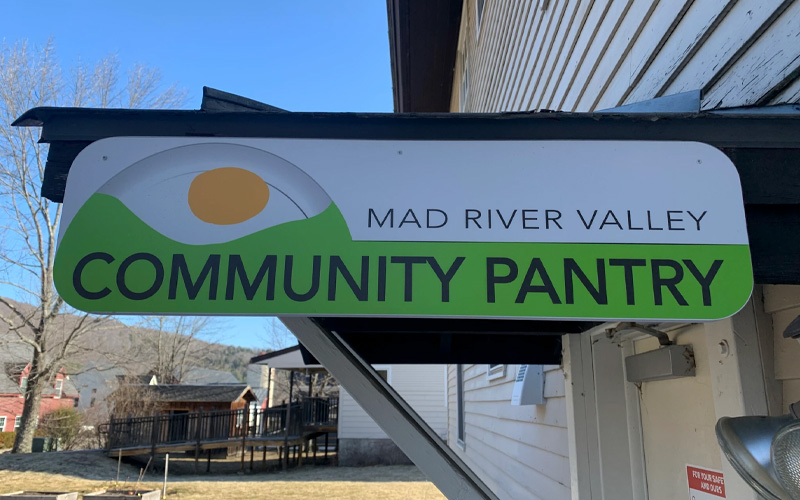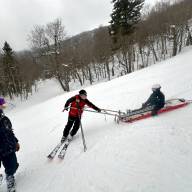Total visits to the Mad River Valley Community Pantry increased by 141% between 2020 and 2022, according to the Mad River Valley 2023 Annual Data Report.
Joanne and Lyndon Virkler, pantry volunteers and members of the pantry leadership team, attribute the rising cost of food to the increase in visits during those years. “Inflation really hit the food pantry,” Joanne Virkler said. “People who normally wouldn’t need assistance, needed a big boost.”
Almost immediately after the COVID-19 pandemic began, food processing facilities slowed or paused operations and grocery prices continued to climb, lasting for much of the pandemic. This was driven by a variety of factors, including shifts in food demand, the effects of avian flu on supply chains, the war in Ukraine and poor weather, according to the Council of Economic Advisers at the White House.
In recent months, advisers said that grocery inflation has finally started to show “signs of cooling.”
Joanne Virkler said that pantry visits have not continued to increase as drastically in 2023. Still, the pantry is providing food for up to 530 residents each month. She said that she saw a big uptick earlier this year when people’s Supplemental Nutrition Assistance Program (SNAP) benefits were cut back.
During the pandemic, Congress increased SNAP benefits to assist low-income individuals and families. But the added supplement was only a temporary move and by last March all SNAP benefits returned to normal amounts, according to the United Stated Department of Agriculture Food and Nutrition Service.
The pantry operates on a $36,000 annual budget. It is funded through the Mad River Valley Interfaith Council – a nonprofit group that collects donations and funds assistance programs for Valley residents. Interfaith Council president Susan Bauchner said, “We have a big budget, but we have a big need, too.”
The pantry stocks food, pet food and toiletries, which vary each week. Joanne Vickler said that they work to provide organic produce, meat substitutes and gluten-free options. They purchase some of what they offer, shopping three days a week. They also pay a membership for deliveries from the Vermont Food Bank.
Other items are donated by Shaw’s and Mehuron’s each week and people donate items directly to boxes at the stores’ entrances. A ‘wish list’ appears in The Valley Reporter and/or one of its twice weekly digital newsletters. That list is also posted to Front Porch Forum and details items that the pantry needs as donations from the public.
Community Harvest of Central Vermont delivers gleaned produce to the pantry on Mondays. Gleaning is the act of collecting leftover crops from farmers' fields after they have been commercially harvested, or on fields where it is not economically profitable to harvest. “We probably get about 40,000 pounds of produce from them in a year,” Joanne Virkler said. “They run a hands-on, pretty intense program.”
Joanne Virkler, who has volunteered at the pantry for seven years, said that she is part of a “tremendous staff” of 12 volunteers, some of whom have worked at food banks in other states. After working as a para-educator at Harwood Union High School for 15 years, she cared for her mother, who struggled with health issues in New Jersey. That experience made her want to advocate and be in service to people.
Lyndon Vickler, a pantry volunteer for the past four years, worked as a chef in fine-dining restaurants, including a private club at the White House. He came to The Valley in the 1980s to cook at Sam Rupert’s Restaurant in Warren. Later, he was an instructor and a dean at the New England Culinary Institute in Boston, MA. He recalled a service-learning project at the school in which students created recipes that drew on ingredients available in Boston food banks.
“I knew the value of food banks,” he said. “That’s why I started volunteering here.”
The MRV Interfaith Council met on Wednesday, October 18, to discuss future fundraising for the pantry. Bauchner said that while the pantry received generous donations during the pandemic, “we’ve worked our way through a lot that funding.”
“In order to meet the increased need for food, and to keep up with rising food prices,” she said, “contributions are needed.”
The pantry’s hours are Wednesdays 4 to 6 p.m. and Tuesdays/Saturdays 10 a.m. to 2 p.m.
Donations can be submitted by check to the MRV Interfaith Council, P.O. Box 342, Waitsfield, VT 05673, or online at mrvcommunitypantry.org.














